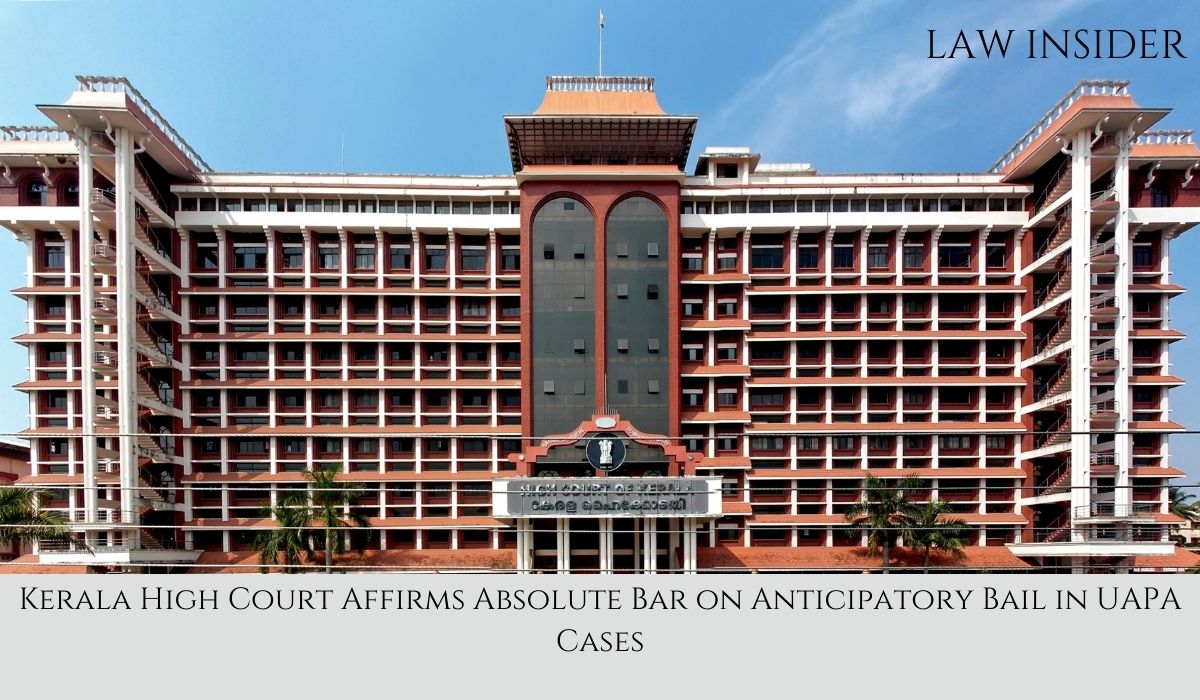LI Network
Published on: 22 July 2023 at 11:50 IST
The Kerala High Court issued a significant ruling, stating that anticipatory bail cannot be granted under any circumstance in cases falling under the Unlawful Activities (Prevention) Act (UAPA). The division bench comprising Justices PB Suresh Kumar and CS Sudha firmly held that applications for anticipatory bail, filed under Section 438 of the Code of Criminal Procedure (CrPC), are not maintainable when the alleged offenses fall under the purview of the UAPA.
The judges emphasized that the exclusion of Section 438 of the CrPC in UAPA cases is absolute, meaning there can be no consideration for anticipatory bail in such situations. They reasoned that granting anticipatory bail in UAPA cases would create an illogical situation where the accused could obtain bail unconditionally, while regular bail would remain subject to restrictions.
The Court further clarified that seeking anticipatory bail is not a fundamental right guaranteed under Article 21 of the Constitution. Considering the present impact of international terrorism on society, the UAPA was enacted to prevent and address terrorist activities deliberately excluding the application of Section 438 of the CrPC to offenses punishable under this act.
The ruling came in response to an appeal by a man accused in the infamous 2020 gold smuggling case, where a considerable amount of gold had been seized by the customs department, smuggled from the UAE through diplomatic channels. Some of the accused had already been granted regular bail, but the appellant sought anticipatory bail under Section 438 of the CrPC before a special court under the National Investigation Agency (NIA) Act.
The special court rejected the anticipatory bail application, prompting the appellant to approach the High Court with the current appeal. The appellant cited a previous judgment, Muhammed Shafi P v. National Investigation Agency, where it was held that mere gold smuggling, without the intention to threaten the economic security of the nation, does not fall within the ambit of UAPA.
The appellant’s counsel argued that his involvement in the smuggling was purely for financial gain, and he should not be charged under UAPA. However, the Deputy Solicitor General of India, S Manu, countered the argument, citing Section 43(D)(4) of the UAPA, which explicitly excludes the application of Section 438 of the CrPC in UAPA cases.
The Court examined the provisions of the UAPA, particularly Section 43(D)(4), which addresses the bar on anticipatory bail, along with the conditions required for granting regular bail. It also considered the objectives of the UAPA, which was enacted to combat terrorism, in line with United Nations resolutions.
In the appellant’s case, the Court noted that the final report had not been filed, and his evasion of arrest was one of the reasons for the delay. As a result, the Court found no grounds to grant pre-arrest bail in this UAPA case.
Ultimately, the Kerala High Court upheld the absolute bar on anticipatory bail in UAPA cases and dismissed the appeal, asserting that such an extraordinary power should not be exercised in cases involving offenses punishable under the UAPA.

